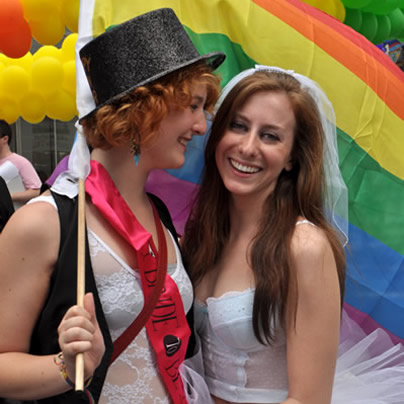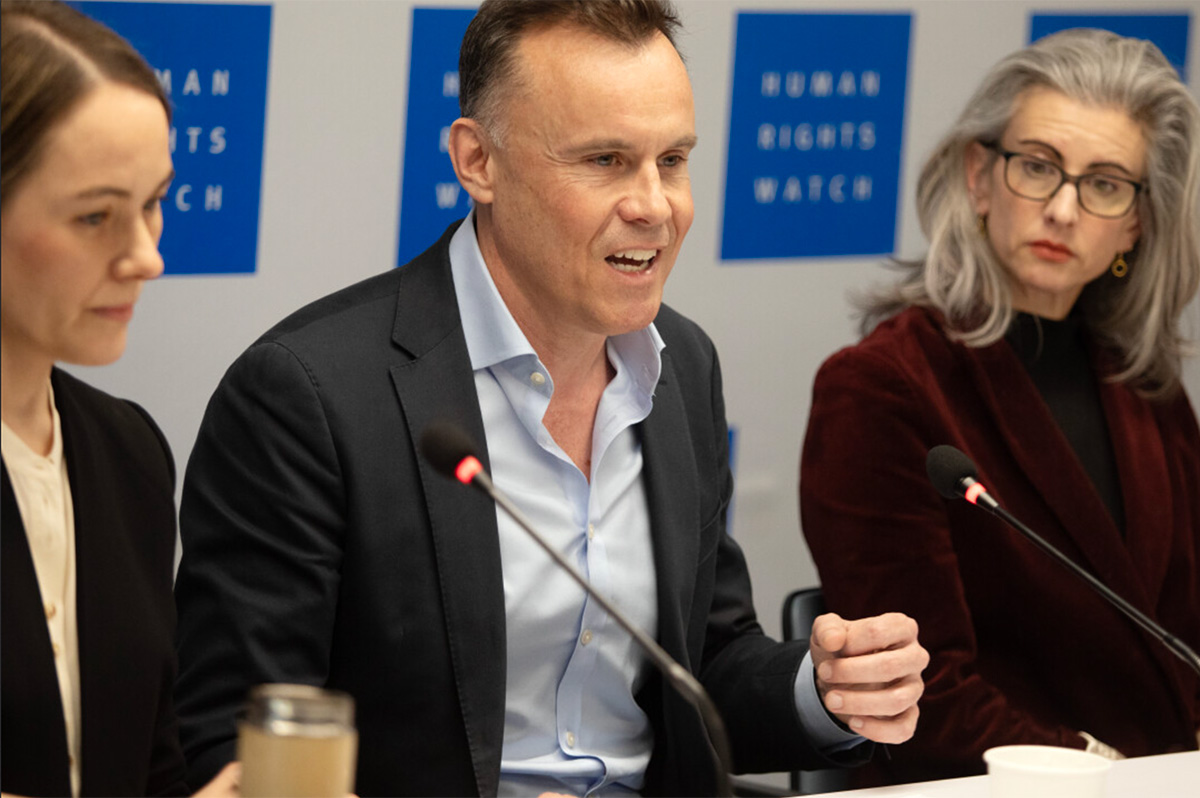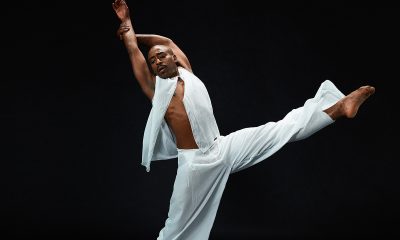National
59 percent of Americans oppose DOMA: poll
More oppose anti-gay law than those who support marriage equality

Fifty-nine percent of the American public say they oppose Section 3 of the anti-gay Defense of Marriage Act after being told it prohibits the federal government from offering benefits to legally married same-sex couples.
The poll, commissioned by the Center for American Progress and Gay & Lesbian Advocates & Defenders, asked registered voters this question amid other inquiries regarding their beliefs on DOMA. The poll was conducted by Goodwin Simon Strategic Research and Voter Consumer Research.
Additionally, the poll asked respondents in a more abstract way whether they believe it’s discriminatory for the federal government to deny benefits to married same-sex couples. Sixty-two percent of registered voters said they believe withholding such benefits is discrimination.
Notably, the poll finds a greater proportion of the American public opposes DOMA than the bare majority that supports marriage equality. According to the poll, 52 percent of the American public supports same-sex marriage — which is consistent with earlier findings on the issue. That means seven percent oppose DOMA, but don’t support marriage equality.
The poll also breaks down views on the denial of certain rights and benefits. More than a majority support awarding each of these rights and benefits to married same-sex couples.
The right that the greater number of respondents said same-sex couples should enjoy is hospital visitation. A full 78 percent said the federal government shouldn’t deny married gay people from seeing their spouse in the hospital. However, DOMA doesn’t prohibit that right and President Obama has issued a memorandum requiring hospitals receiving Medicare and Medicaid to grant such visitation rights.
But the benefit that the smallest proportion of respondents supported for same-sex couples was Social Security benefits in case of the death of the spouse. Even so, 66 percent said the federal government shouldn’t deny these benefits. DOMA prohibits this benefit from flowing to same-sex couples.
Mary Bonauto, GLAD’s civil rights director, said she’s not surprised that a majority of the American public opposes DOMA given the harm the anti-gay law inflicts on same-sex couples.
“With each passing day, more and more Americans are learning how DOMA denies important marital protections and heaps disrespect on married same-sex couples across the country – and they’re saying, ‘Enough is enough,’ Bonauto said. “It’s not surprising that a majority of this country now believes that loving, committed couples in legal marriages should be treated fairly under federal law. It’s time for our laws to catch up with where public opinion is on abolishing DOMA.”
Litigation challenging DOMA known as Windsor v. United States is pending before the Supreme Court. Justices are expected to render a decision before their term expires in June.
Winnie Stachelberg, executive vice president at the Center for American Progress, said the poll should influence justices’ thinking as they consider the anti-gay law.
“The findings of this poll should provide significant headwinds to LGBT advocates and allies and demonstrate to the Court that the thinking behind DOMA is outdated and indefensible,” Stachelberg said.
On the same day the DOMA poll was made public, the Respect for Marriage Coalition — a partnership of LGBT groups and others working to advance marriage equality — issued another poll finding promising results for marriage equality.
Three-quarters of respondents to this poll, or 75 percent, believe same-sex marriage is a constitutional right, which is up from 71 percent in 2011. Additionally, 77 percent said they believe same-sex marriage will be legal nationally “in the next couple of years” regardless of their personal views on the issue.
National
Human Rights Watch sharply criticizes US in annual report
Trump-Vance administration ‘working to undermine … very idea of human rights’

Human Rights Watch Executive Director Philippe Bolopion on Wednesday sharply criticized the Trump-Vance administration over its foreign policy that includes opposition to LGBTQ rights.
“The U.S. used to actually be a government that was advancing the rights of LGBT people around the world and making sure that it was finding its way into resolutions, into U.N. documents,” he said in response to a question the Washington Blade asked during a press conference at Human Rights Watch’s D.C. offices. “Now we see the opposite movement.”
Human Rights Watch on Wednesday released its annual human rights report that is highly critical of the U.S., among other countries.
“Under relentless pressure from U.S. President Donald Trump, and persistently undermined by China and Russia, the rules-based international order is being crushed, threatening to take with it the architecture human rights defenders have come to rely on to advance norms and protect freedoms,” said Bolopion in its introductory paragraph. “To defy this trend, governments that still value human rights, alongside social movements, civil society, and international institutions, need to form a strategic alliance to push back.”

The report, among other things, specifically notes the U.S. Supreme Court’s Skrmetti decision that uphold a Tennessee law banning gender-affirming medical interventions for minors.
The Trump-Vance administration has withdrawn the U.S. from the U.N. LGBTI Core Group, a group of U.N. member states that have pledged to support LGBTQ and intersex rights, and the U.N. Human Rights Council. Bolopion in response to the Blade’s question during Wednesday’s press conference noted the U.S. has also voted against LGBTQ-inclusive U.N. resolutions.
Maria Sjödin, executive director of Outright International, a global LGBTQ and intersex advocacy group, in an op-ed the Blade published on Jan. 28 wrote the movement around the world since the Trump-Vance administration took office has lost more than $125 million in funding.
The U.S. Agency for International Development, which funded myriad LGBTQ and intersex organizations around the world, officially shut down on July 1, 2025. The Trump-Vance administration last month announced it will expand the global gag rule, which bans U.S. foreign aid for groups that support abortion and/or offer abortion-related services, to include organizations that promote “gender ideology.”
“LGBTQ rights are not just a casualty of the Trump foreign policy,” said Human Rights Watch Washington Director Sarah Yager during the press conference. “It is the intent of the Trump foreign policy.”
The report specifically notes Ugandan authorities since the enactment of the country’s Anti-Homosexuality Act in 2023, which punishes “‘carnal knowledge’ between people of the same gender” with up to life in prison, “have perpetrated widespread discrimination and violence against lesbian, gay, bisexual, and transgender (LGBT) people, their families, and their supporters.” It also highlights Russian authorities “continued to widely use the ‘gay propaganda’ ban” and prosecuted at least two people in 2025 for their alleged role in “‘involving’ people in the ‘international LGBT movement’” that the country’s Supreme Court has deemed an extremist organization.
The report indicates the Hungarian government “continued its attacks on and scapegoating of lesbian, gay, bisexual, and transgender (LGBT) people” in 2025, specifically noting its efforts to ban Budapest Pride that more than 100,000 people defied. The report also notes new provisions of Indonesia’s penal code that took effect on Jan. 2 “violate the rights of women, religious minorities, and lesbian, gay, bisexual, and transgender (LGBT) people, and undermine the rights to freedom of speech and association.”
“This includes the criminalization of all sex outside of marriage, effectively rendering adult consensual same-sex conduct a crime in Indonesia for the first time in the country’s history,” it states.
Bolopion at Wednesday’s press conference said women, people with disabilities, religious minorities, and other marginalized groups lose rights “when democracy is retreating.”
“It’s actually a really good example of how the global retreat from the U.S. as an actor that used to be very imperfectly — you know, with a lot of double standards — but used to be part of this global effort to advance rights and norms for everyone,” he said. “Now, not only has it retreated, which many people expected, but in fact, is now working against it, is working to undermine the system, is working to undermine, at times, the very idea of human rights.”
“That’s definitely something we are acutely aware of, and that we are pushing back,” he added.
Maryland
4th Circuit dismisses lawsuit against Montgomery County schools’ pronoun policy
Substitute teacher Kimberly Polk challenged regulation in 2024

A federal appeals court has ruled Montgomery County Public Schools did not violate a substitute teacher’s constitutional rights when it required her to use students’ preferred pronouns in the classroom.
The 4th U.S. Circuit Court of Appeals in a 2-1 decision it released on Jan. 28 ruled against Kimberly Polk.
The policy states that “all students have the right to be referred to by their identified name and/or pronoun.”
“School staff members should address students by the name and pronoun corresponding to the gender identity that is consistently asserted at school,” it reads. “Students are not required to change their permanent student records as described in the next section (e.g., obtain a court-ordered name and/or new birth certificate) as a prerequisite to being addressed by the name and pronoun that corresponds to their identified name. To the extent possible, and consistent with these guidelines, school personnel will make efforts to maintain the confidentiality of the student’s transgender status.”
The Washington Post reported Polk, who became a substitute teacher in Montgomery County in 2021, in November 2022 requested a “religious accommodation, claiming that the policy went against her ‘sincerely held religious beliefs,’ which are ‘based on her understanding of her Christian religion and the Holy Bible.’”
U.S. District Judge Deborah Boardman in January 2025 dismissed Polk’s lawsuit that she filed in federal court in Beltsville. Polk appealed the decision to the 4th Circuit.
Minnesota
LGBTQ Minnesotans speak out amid ICE crackdowns
‘Our nervous systems are not set up to live under constant threat’

Uncloseted Media published this article on Jan. 31.
By HOPE PISONI, SAM DONNDELINGER, SPENCER MACNAUGHTON, and TAYA STRAUSS | Since the start of December, Minneapolis and St. Paul, Minn., have been under the thumb of an extremely heavy presence of the U.S. Immigration and Customs Enforcement.
During the crackdown, which the agency refers to as “Operation Metro Surge,” at least 3,000 people — mostly undocumented immigrants — have been arrested so far. Tensions came to a boil in January when federal immigration enforcement agents shot and killed poet Renee Good and ICU nurse Alex Pretti on separate occasions. In response, Minneapolis-area residents have started to push back. On Jan. 23, Minnesotans organized the first citywide general strike in the U.S. in nearly 80 years, with tens of thousands protesting and over 700 businesses closing in solidarity. And additional protests are taking place nationwide in at least 36 states over Jan. 30 and 31.
Many queer people have been on the frontline of these protests. We spoke with six people on the ground in the Twin Cities to learn more.
Watch the full interview above or read the transcript here:
SPENCER MACNAUGHTON: Hi everyone, I’m Spencer Macnaughton, and today I am here with six queer folks from the Minneapolis area. Everyone, thank you so much for speaking with me and Uncloseted Media today.
ALL: Thanks for having us.
SM: Yeah, great to be with you. And obviously we reached out to you all based on the headlines. And a lot of what’s playing out at the national level is happening right there in Minneapolis where you guys live. And I just wanted to start to really get a pulse check. How are you guys feeling right now? I have not been in Minneapolis. For folks who only see what’s unfolding on social media or on TV, take us inside what life has been like for you all the past few weeks.
RACHEL DOMINGUEZ: It’s incredibly stressful. Our nervous systems are not set up to live under constant threat. That’s the biggest thing that I think people are not understanding about what’s going on. And I’ve lived in Minneapolis for 41 years. We had a little dress rehearsal for this about five years ago, but it was nothing — there was no precedent. There’s no precedent for this. It’s like water about to come to a boil. Everyone here is stressed out. We’re angry. We’re scared for our safety, for our neighbors’ safety, for our livelihoods. We have no idea when this is gonna stop. Oh, and it’s two fucking degrees out.
JUNE REICHERT: It’s hard to go on like normal when this is happening. Part of my, and I’m sure everybody in your profession, is to not even acknowledge it. Pretend that everything’s okay while you’re at work, while you are going to school, while you are going shopping and everything. And little do you know, down the street, a Somali family is being harassed for no good reason. It brings this feeling of sorrow, especially when it does affect your professional life. When somebody who you’ve been working with for a long time, all of a sudden, as part of my job, I can’t get a hold of them. I work with a lot of people from the Hispanic community and they’re just gone. And you just sit wondering. It’s horrible. It’s a horrible feeling.
SM: And June, tell me more about that. That actually happened?
JH: So for what it’s worth, I sell insurance. I have had clients who have been picked up and I can’t get a hold of them. I mean, I can verify what happened to them, but these people I’m able to get a hold of every single day when I need to, to take care of this, that or the other issue. And now I can’t get a hold of them for a week straight. What am I supposed to think? You know?
SKOT RIEFFER: My day job, I work for a catering company. We have no work at my catering company for the next two months because every single event has canceled because of the ICE occupation. And these events are things from corporate events to weddings. And we’re all now without a job, essentially. My catering company is maybe 30 percent white people and so all of us are checking in with everyone else all the time. One of our folks, also a member of the Hispanic community, has lost four family members. They just got kidnapped. And they’re just gone.
ALICIA KOPP: I am the child of a migrant. I’m from a mixed heritage. My father is from Guatemala. He’s been a citizen since ‘83. Right now, we’re not letting him leave the house. We’re running all errands. The stress that you had spoken to earlier, Rachel, that is definitely wearing thin on all of us.
SM: I mean, what type of mental health effects is that having on him by not being able to leave the house and also probably understanding the reasons why he’s not leaving the house?
AK: When I handed him things like, I showed him what was in a whistle kit with the red cards. This is an emergency contact card. On the inside, the top part says, “help me,” and it’s got whoever’s holding it, their information. The bottom has their loved one and their lawyer and contact information. And they carry this in one of these red cards that on one side has your constitutional rights and on the other side says what you would tell to an immigration agent if they tried to stop you. Or you would just put it up to the window in your car or slip it through, so that you don’t have to talk to them. Now, what good it does? Yeah, I don’t exactly know. Because they’re not exactly following the rules, they kind of tell a lot of people, “That doesn’t matter, we don’t care.” But with this contact card, you have it on you, you literally hand it to somebody if you feel like you’re about to get picked up and say, “I need help. Contact this person for me.” Trying to explain to my dad why, even though he’s a citizen now, I wanted him to have this on him if he’s leaving the house? That was hard. And he was a little belligerent at first. I’m just like, “Look, you’ve kept me alive for 50 fricking years. It’s my turn to do the same for you. And right now, they don’t care that you’re a citizen. They just see you and they go, ‘Yep, we don’t want him here.’ And they’re gonna take you away. You’ll be away from your medicine. You’ll be away from us. It will take us how long to figure out where you are.” Even if it’s like hours, that probably isn’t great for somebody that probably shouldn’t be rassled to the ground by young dumb men or women or whoever they are. But you know, it’s hard. It’s really hard for him and it’s hard for all of us because you don’t wanna have to talk to your parents like that.
TERRESA HARDAWAY: I just wanted to comment on how I’m feeling in this moment, and I would say that while I am tired, I’m not exhausted. And it’s because Black people have always been under occupation. And I’m so happy that people are coming to the realization that state violence and national violence is something that affects all of us. But I gotta say my exhaustion probably comes from the long story posts and the Instagram posts of people realizing for the first time that they are also a part of this system. And they realize that they are also subject to be attacked and to be violently murdered in the street, just like Black people, I think that’s where my exhaustion might come in. But I will say, because we are used to this, I know that this is not gonna be the final moment. I don’t want to hold onto this hopelessness that I feel like a lot of folks who are just coming into that realization are starting to feel on their own. And so we have to just keep fighting. And as tired as we are, now is the time for us to actually push the system that we want to stop harming our neighbors.
SM: And how do you push a system in this moment? What is the strategy in terms of pushing? Because, you know, it does feel like a moment where change could happen because there’s so much attention on it.
TH: There are many, many ways that folks can tap into mutual aid networks, can tap into organizations who have been advocating for immigrant rights and equity in those spaces. If there are holes within our neighborhoods that need to be filled, people need food, people need supplies, and they aren’t comfortable leaving their house, there are organizations who have already been doing that work that people can tap and support. People can become legal observers. There is a lot of things that folks could do. This anxiety that I know that we’re all feeling and this exhaustion? I would say focus that into some of the work that’s already happening.
RD: My kid has only gone to Southside Family School for his entire life. That’s where Renee Good, that’s where her kid went. Still goes there actually. So, our kids, first off, they couldn’t be in school. Because the New York Post ran some bullshit article about how our school was some like communist indoctrination training center that recruited her to join an ICE watch. And then all of a sudden death threats, bomb threats, people coming into the teachers’ houses and knocking on the doors and running away. Bomb threat, they had to bring the dogs in. So my kid didn’t even get to go to school for two weeks and now they’re back in school in a secret location. Like this is the fucking Taliban that we’re hiding from.
SM: Wow.
RD: I can’t even say where my kid goes to school. We’re not even supposed to text it.
SM: I’m sorry you have to do that. And I, yeah, and we’ve all seen those harrowing headlines and images of children as young as 2, as young as 5, being taken by ICE over the last few weeks. I wanted to ask more broadly, for the kids you guys know in your life, what is the impact this is having on children?
AK: A lot of stuff for kids are being canceled. I know that the Minnesota Orchestra has canceled their Young People’s Concert Series for the time being because it’s just not safe to go down there. The students that auditioned last spring to be part of the All State Ensembles, all of their concerts have been canceled because it is just not safe.
SR: My partner and I have started doing neighborhood patrols because there’s a daycare two houses down from ours that caters to our small little, poor community around here and everything like that. And so there’s a lot of different folks who go to this daycare. And so every morning from 7:30 ‘til 10, I’m out there, and then from 3 until 5, which is the pickup times. And so we’re out there as observers.
And there’s been some real scary things, and one thing that is really burned in my head was this dad came up and was chatting with me and thanking me for being there and whatnot. He said to me that his kid, his daughter came up to him and asked him, “Dad, what do I do when the men come and take my friends?” And he didn’t have an answer and he was like, “I feel like my job as a dad is to be able to answer these questions and I do not have an answer” and he was sitting there, and we’re outside, it’s –10 and he’s crying. And I’m crying. And our tears are freezing to our damn faces and all I can do is just nod and hug this guy and just be like “yeah, I don’t have an answer either, man.”
SM: You mentioned the ICE patrolling. Tell me about what that is, what you do and why you’re doing it.
SR: We’re just looking for suspicious vehicles. So if out-of-state plates, a slew of identical looking SUVs drive by, we’re marking it, we’re reporting it to the other people in our Signal groups and everything like that. And then in the situation, just the other day, there were three black SUVs that drove by, all of them with ICE agents in full equipment, everything. So we reported all of that. We’re monitoring, we’re taking pictures, we are marking plates, we’re running plates if needed, and just letting every — like there’s a Hmong Market just down the road, and so we let them know. There’s a small, kind of a strip mall that’s almost all owned by people of color, and we call one of them and then they distribute the word and they’ll lock their doors if we see anyone. Just things like that.
SM: When you say you report it, who do you trust right now to report to?
SR: Our neighbors.
SM: Your neighbors.
SR: We have a Signal group, I’m part of several Signal groups. I will get called. Someone will tell me and be like, “hey, we need a big white guy here right now.” And I will show up. And then when I get there, I see things, I take pictures, I send it to that group and I send it to my group of my immediate block of neighbors. And so then they all know, and then they’ll either go check on the neighbors next door who didn’t respond in the group or will drive to the daycare or whatever is needed to do.
SM: Maybe this is a dumb question, but why do you think they’re saying “we need a big white guy”?
SR: I mean, I’m just as likely to get shot and killed and kidnapped and everything as anybody else at this point. But if they’re trying to push the agenda that these types of people are bad people and whatnot, and if in every camera frame that they have, if there’s someone who looks just like you? That bullshit narrative, it’s harder for them to sell it. If I’m standing there, it’s harder for them to sell it. And I hate it. It sucks on so many levels, obviously.
SM: Can people talk about what they’re doing to push back?
TH: Yeah. I think for me and my teams at Blackbird Revolt and Black Garnet Books, we have these spaces. And so this is something that we didn’t have in 2020. And so being able to activate these spaces, hosting a poster making and community space for folks to come together who do feel similarly and just want to be in space with each other has been really amazing. We are also holding a drive where folks can purchase a book, that’s either in English, Spanish or Somali, that we’re able to deliver to families that don’t feel comfortable leaving their homes.
RD: The people here, we don’t have any faith in the politicians, that they’re going to do anything meaningful or that they have any power at all. We don’t have any faith that the police are going to protect us or that the National Guard is gonna protect us or that Tim Walz or Jacob Frey or any of them are gonna be able to protect us.
SM: Why don’t you feel like you have faith in Jacob Frey? I mean, when I see him on TV and he’s saying “get the hell out,” it seems like he’s giving his best effort, but is that a sentiment that is not felt on this call?
SR: It’s super fucking easy to say “get the fuck out.” We’re all saying that, but all of us are also in the street. All of us are also helping, donating food, donating time. Where the fuck has he been?
TH: I’m seeing the real people who are standing up for these communities out at the protest. I ain’t never once seen that man and that man just stay talking shit and never moves and never has any action behind it. Fuck that man. Fuck all of this whole, “get the fuck out.” Stop, anybody can say a cuss word, but you actually have the power to pass policy and you’re not doing it. So it’s not about not having faith. We have a history of seeing them say shit and then not backing that up with action. So it’s not about faith. We have a historical record of y’all not doing shit for the people.
SM: So let me ask then quickly, what do you want him to do? What could he do that would be meaningful right now if he could actually do, that’s within his power?
JH: If you don’t want to start a constitutional crisis by arresting an ICE officer while he’s doing the awful things that he’s doing, fine, I guess. I would argue differently.
RD: No, that’s not fine. That’s what they should do. That’s what they could do.
JH: Correct.
RD: They could get some fucking balls and call the commanders into their office and say, “Look, are you loyal to the constitution or are you a Nazi that’s gonna fold?”
JH: If these people want to preserve whatever level of normalcy that we know has not existed as Rachel, Terry and Alicia have all described, then citations, parking violations, trespassing violations, these people are using their administrative warrants, that are not admissible to use to enter people’s homes, to enter people’s homes. And they aren’t getting trespassing citations for that. They aren’t getting charged for that, I don’t even think the mayor has talked about the fact that they’re doing that. And these are all things that are actions that can be done instead of tweeting really hard. I want action. I don’t want words. I don’t want you to look like a big tough guy and to get all the people on Twitter or Bluesky or whatever to go, “Oh, he owned him.” I want them gone. I don’t want them here anymore.
SR: He could at the very least talk to us. All he’s doing right now is talking to the media. Talk to us, show up. Maybe he’s doin’ shit behind closed doors. Okay fine, but tell us. Talk to us. Come out, listen. Talk. Be present.
SOREN ASTER: One thing we did at the clay pit as well is I changed it to appointment only. I did as much research as I could on how to keep ICE from coming into the public space of my business, and I found that by making it by appointment only, the whole space becomes private and they cannot come in. So my door stays locked. I let people in as I see fit, but just as another form of precaution, keeping those doors locked. It’s an absolute nightmare.
SM: It literally sounds like it’s created a situation where every move you make is nerve-wracking because of what’s happening.
SA: Absolutely.
SM: I’ve heard many people saying that what’s unfolding in Minneapolis is a queer story. And I find that interesting. And I’m curious, do you guys agree with that?
JH: I want to push back a lot on the idea that this is a very queer thing that’s happening. As a transgender person, I’ve been a community activist for quite a while, especially in 2022 when the federal government, from my perspective, was failing to protect my trans siblings in states like Florida and Texas. There’s a lot of my activism that I do that is directly fueled by my queer identity. My neighbors, my friends, my colleagues, my clients even, are being attacked by a force that is an invasion to our city and our state. And it is on me as a human with human emotions and a personal connection to this place to protect my community, and that’s got nothing to do with me being gay. The motivation is, in this instance, for one of a very rare time in my experience, very disconnected from my queer identity. It’s got more to do with protecting Minnesotans. It’s got more to deal with protecting communities, immigrant communities and communities of color who people who look like me, as we’ve discussed here, famously just don’t even bat an eye at, and it’s wrong.
SA: I don’t think it’s an inherently queer thing, but I think that queer people and Black and Brown people are used to having to rely on our community, rather than our government and other people to get the things that we need and to get the support and to make things happen. We’re used to having to riot, and we’re used to having to scream and try and get people to listen to us and our stories. And so I think when this started. The first people that really knew what to do and how to do it and how to organize are those people. And so I think that it’s one part of the story.
SM: One thing we had mentioned earlier is what happened in Minnesota in 2020. Many have compared what’s happening now to the George Floyd protests of 2020. Um, how do you guys compare it? How is it different? How’s it similar?
AK: The big difference? We knew who the police were, we kind of know who these people are, but we don’t know who those people are. We know that they are some of the same people that were let out of the Jan. 6 stuff because of the pardon. And we know they’re likely a lot of the cops that left the profession because they couldn’t beat up on people so freely in Minneapolis anymore with some of the initiatives that have been trying to change the culture of our police forces.
Editor’s Note: While some government officials, including U.S. Reps. Jamie Raskin (D-Md.) and Steve Cohen (D-Tenn.) have called for the DOJ to release information on any participants of the Jan. 6 insurrection employed by ICE, no details have been published. Additionally, several police chiefs and sheriffs have reported that ICE has tried to poach their officers for recruitment, but Uncloseted Media was unable to confirm any cases of this in Minneapolis.
TH: I think for me, I compare it to the longevity of support that’s gonna be happening. I think that after a year, after the protests, after the uprisings, it went back to business as normal, business as usual. I’m also a runner. And so when I’m gonna run a short distance, if I know I’m just trying to get a fast-ass time running a mile, I’m gonna run at that at full velocity. And I feel like people who are just getting activated, that’s what they’re doing. They’re running at it at full velocity and then they get exhausted. Y’all need to run this as if it’s gonna be a 50 mile race. I think for me, how I was activated during the uprisings, I’m really leaning on community. I am texting my group of white allies and being like, “Y’all, I need y’all to pick this up. I need you to help me here, dah dah dah.”
JH: It is unfortunate to me that many people, similar to in 2020 and 2021, will see the immediate aftermath of something and see Derek Chauvin got arrested or whatever it is, and they’re done. And that’s it. And we made the change. And now we can go back. It’s a joke in my community: We can go back to brunch. No we can’t. We’re not done. And they think once ICE is out of Minneapolis and the white people stop dying, then they can just go back to sipping their tea. And I’m worried about that. So it’s a push and pull, and I really want to remain optimistic, and I know there is a future worth fighting for. But I’m also worried that some people will see the short-term victories and give up.
SM: Trump has said that Minnesotan protesters are “left-wing agitators.” I want to know, maybe as a last question, I want to know, how important is protest and what else is getting you through right now?
AK: Well, protest is very important to me, but also understanding the multitude of ways that you can participate in protest. You don’t have to be out necessarily facing off with people that are on an opposing side. You are doing protest by maybe doing a Zoom concert because your concert got canceled and you’re still going to play. Or by delivering food for neighbors and other health and home needs, like laundry detergent is a huge one right now that people need as well as just things like shampoo and soap.
SA: All of the reactions that have happened are really logical when you think about it from an outside perspective. If you take out left and right and the political ideologies of it all, people are coming in and abducting people that are here, mostly not committing crimes. A lot of people, perfectly legal. In any other situation, I think the logical answer would be to fight back and to step up to your community and do what you can to prevent those kidnappings and to prevent that violence from happening.
TH: Protests were so important that it is the first amendment. And so when we get asked things like, “Why are we protesting?” The country was founded on that. I don’t want people to just only relate it to Black people or just to trans people. It was something that was laid at the foundation of this country. We do get to say what we want our government to do and protest is our way of being able to speak out about that. And if you weren’t comfortable with that, you shouldn’t have ran for president.





















